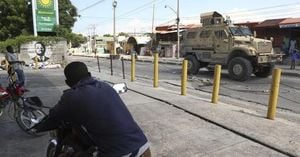After recently returning from the Congo, 55-year-old Andrea Poloni from Trevignano tragically passed away on December 16, 2024, due to what has been described as hemorrhagic fever. His unexpected death has sent shockwaves through his community, prompting immediate health responses from local authorities.
Poloni, who owned Solosole srl, a company specializing in photovoltaic panels, left behind his Eritrean wife and daughter. Reports indicated he had been feeling unwell shortly after returning from his trip, showing troubling symptoms such as high fever and signs of internal bleeding. First responders were called to his home, but unfortunately, his condition was already dire by the time help arrived.
Officials from the Public Hygiene Service of the Usl 2 Marca Trevigiana confirmed the case as suspicious and have initiated thorough investigations to trace the source of his illness. Collaborations with Rome’s Spallanzani Institute are part of these efforts. Protocols for public health response have also been activated as authorities aim to prevent any potential outbreak related to his case.
The death has prompted precautionary measures, including the isolation of the only known contact Poloni had since falling ill. According to health reports from the Democratic Republic of the Congo (DRC), the country’s Ministry of Health has declared the previously unidentified illness circulating around Panzi—a region where Poloni had traveled—to be severe malaria. This announcement came after alarming reports of 143 deaths attributed to this disease just weeks before Poloni’s return.
"The mystery has finally been solved. It’s severe malaria, manifesting primarily as respiratory disease, compounded by malnutrition," stated the DRC Ministry of Health. This new classification has relieved assumptions of other unknown pathogens responsible for the appalling death toll earlier reported.
While initial testing indicated malaria as the leading cause, authorities are still awaiting definitive results from samples sent to the World Health Organization (WHO) for additional analysis. The situation remains fluid. The WHO reported the collection of several samples from the affected area, emphasizing rigorous testing and continuous monitoring.
Despite the DRC’s clarity on the causative agent, WHO representatives expressed the need for more thorough investigations. "We have not yet definitively determined the cause of the unidentified illness," they stated. It seems this uncertainty stems from the logistical challenges of reaching the remote Panzi region, which has delayed the identification process.
The public health system is gearing up to respond as necessary to this developing crisis. Medications to combat malaria have already been distributed to key hospitals and healthcare facilities within the impacted health zone, with additional supplies expected to arrive soon.
Locally, the community of Trevignano is grappling with shock over Poloni’s sudden demise. Town officials and residents are mourning the loss of one of their own, reminiscing about his contributions to local agriculture and renewable energy through his work with solar panels. The mayor expressed his condolences and is prepared to take any necessary public health measures as new information becomes available.
Now, as investigations continue and health measures are put in place, the focus shifts to mitigating risks associated with this disease, ensuring anyone at risk receives immediate care and monitoring. The community, shaken yet strong, stands together through this trying time, awaiting more clarity on the health scare and the future of their beloved Trevignano.
The case of Andrea Poloni is more than just numbers and sickness; it paints the picture of the intertwining of lives, cultures, and the unforeseen vulnerabilities we all share. His story is now part of the emergency response narrative, highlighting the necessity for swift action and awareness when international travel intersects with health crises.



